Unit 10 You’re supposed to shake hands. Section A 3 (Grammar Focus-4c)课件(共23张PPT)
文档属性
| 名称 | Unit 10 You’re supposed to shake hands. Section A 3 (Grammar Focus-4c)课件(共23张PPT) |
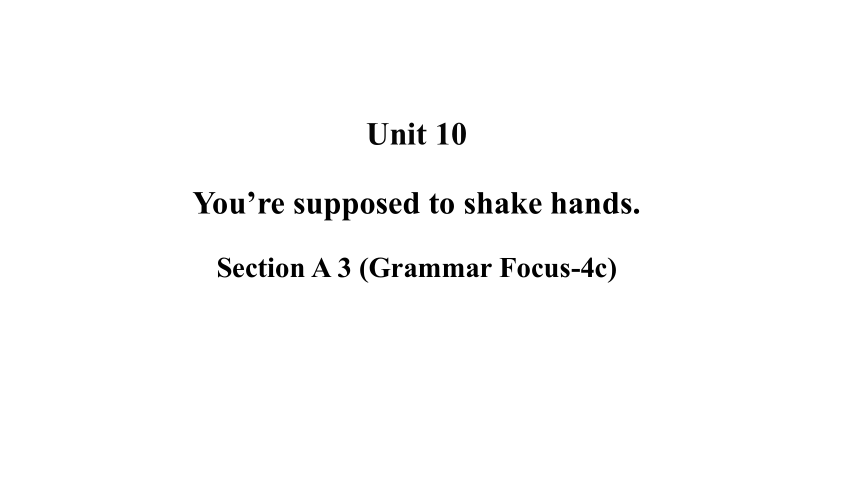
|
|
| 格式 | pptx | ||
| 文件大小 | 1.0MB | ||
| 资源类型 | 教案 | ||
| 版本资源 | 人教新目标(Go for it)版 | ||
| 科目 | 英语 | ||
| 更新时间 | 2023-09-14 19:58:26 | ||
图片预览

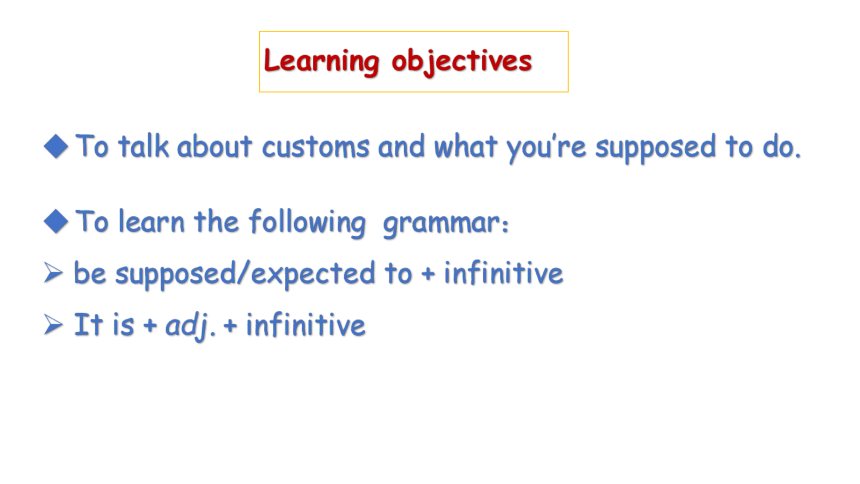


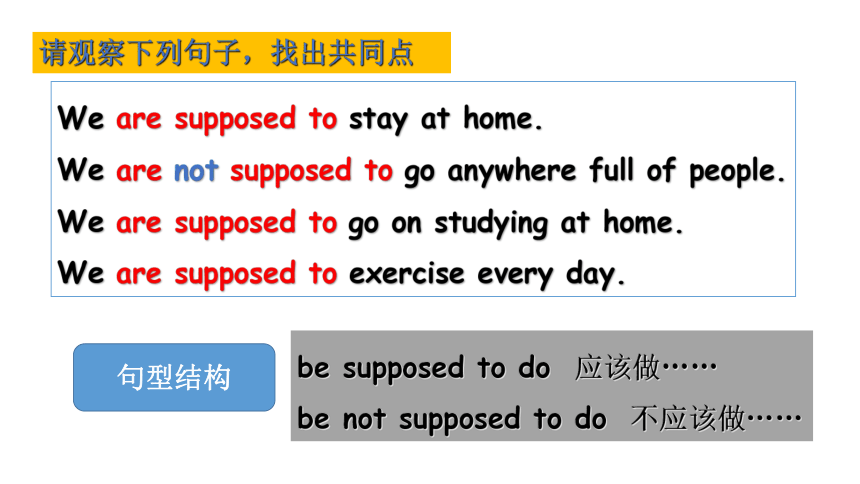
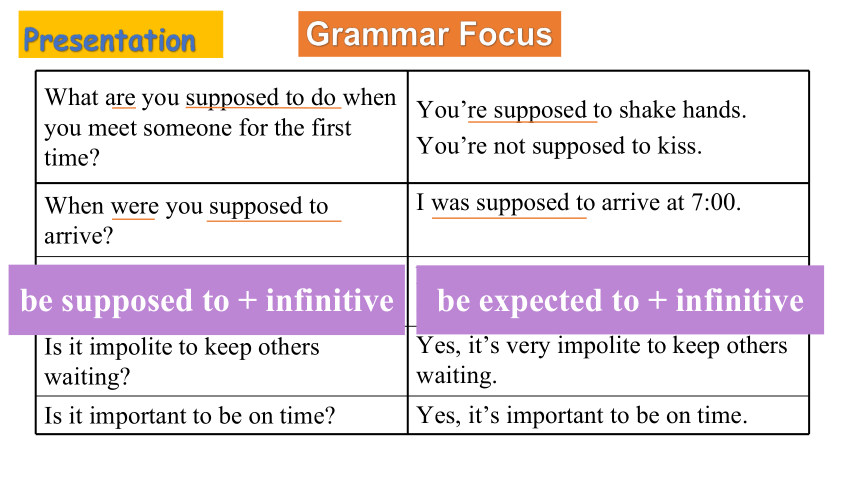
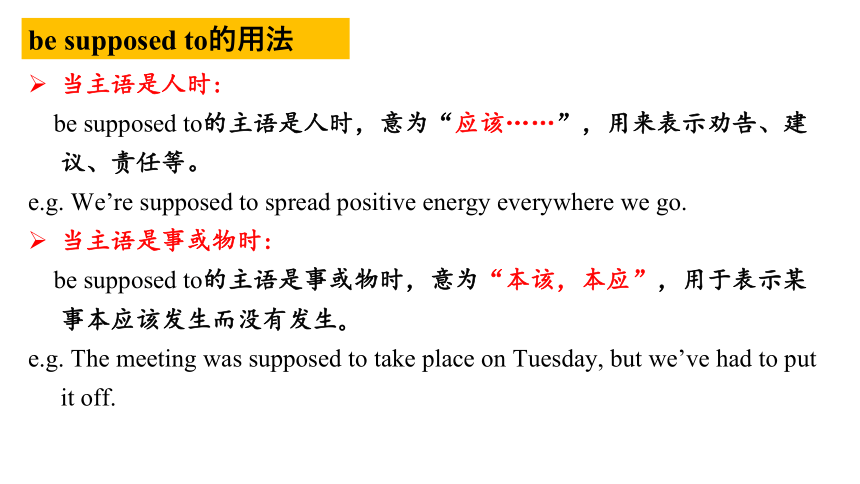
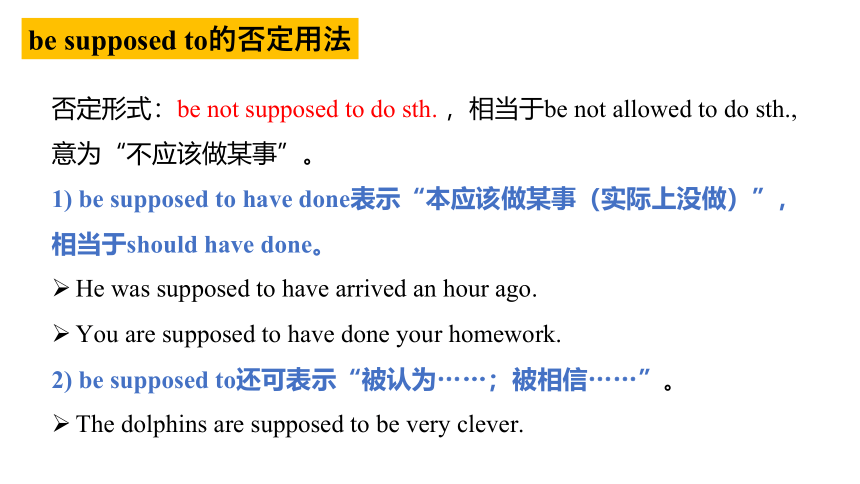
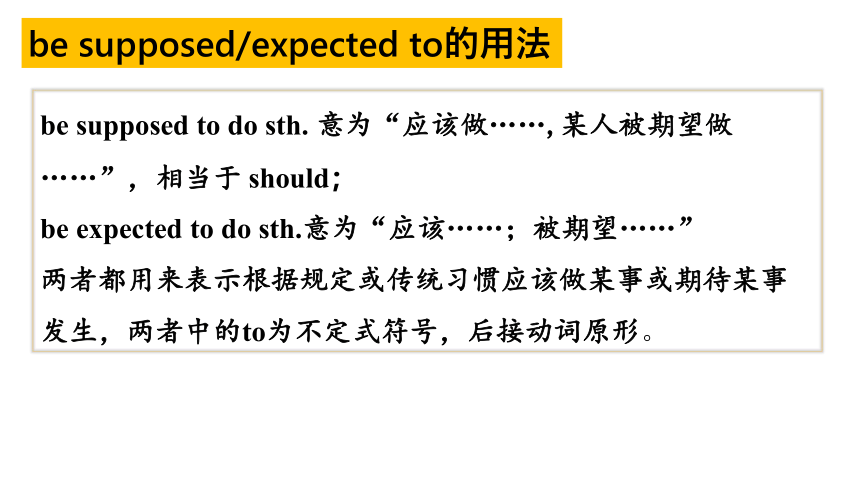
文档简介
(共23张PPT)
Unit 10
You’re supposed to shake hands.
Section A 3 (Grammar Focus-4c)
To talk about customs and what you’re supposed to do.
To learn the following grammar:
be supposed/expected to + infinitive
It is + adj. + infinitive
Learning objectives
Lead in
As students, what should we do at this time
We are supposed to stay at home.
We are not supposed to go anywhere full of people.
As students, what should we do
We are supposed to go on studying at home.
We are supposed to exercise every day.
We are supposed to stay at home.
We are not supposed to go anywhere full of people.
We are supposed to go on studying at home.
We are supposed to exercise every day.
请观察下列句子,找出共同点
be supposed to do 应该做……
be not supposed to do 不应该做……
句型结构
What are you supposed to do when you meet someone for the first time You’re supposed to shake hands.
You’re not supposed to kiss.
When were you supposed to arrive I was supposed to arrive at 7:00.
Am I supposed to wear jeans No, you’re expected to wear a suit and tie.
Is it impolite to keep others waiting Yes, it’s very impolite to keep others waiting.
Is it important to be on time Yes, it’s important to be on time.
Grammar Focus
Presentation
be supposed to + infinitive
be expected to + infinitive
be supposed to的用法
当主语是人时:
be supposed to的主语是人时,意为“应该……”,用来表示劝告、建议、责任等。
e.g. We’re supposed to spread positive energy everywhere we go.
当主语是事或物时:
be supposed to的主语是事或物时,意为“本该,本应”,用于表示某事本应该发生而没有发生。
e.g. The meeting was supposed to take place on Tuesday, but we’ve had to put it off.
be supposed to的否定用法
否定形式:be not supposed to do sth. ,相当于be not allowed to do sth., 意为“不应该做某事”。
1) be supposed to have done表示“本应该做某事(实际上没做)”,相当于should have done。
He was supposed to have arrived an hour ago.
You are supposed to have done your homework.
2) be supposed to还可表示“被认为……;被相信……”。
The dolphins are supposed to be very clever.
be supposed to do sth. 意为“应该做……,某人被期望做……”,相当于 should;
be expected to do sth.意为“应该……;被期望……”
两者都用来表示根据规定或传统习惯应该做某事或期待某事发生,两者中的to为不定式符号,后接动词原形。
be supposed/expected to的用法
be expected to do sth.
“被期许(预期)会做某事, 希望做某事, 表示一种可能性。
e.g. She was expected to arrive before dinner.
希望她晚餐前到达。
be supposed to do相对于be expected to do主观性更强一些。
be supposed to do sth. & be expected to do sth.的区别
Presentation
You are supposed/expected to shake hands.
1)肯定句:
2)否定句:
3)一般疑问句:
4)特殊疑问句:
be supposed/expected to的结构
You are not supposed/expected to shake hands.
Are you supposed/expected to shake hands
What are you supposed/expected to do
Grammar Focus
What are you supposed to do when you meet someone for the first time You’re supposed to shake hands.
You’re not supposed to kiss.
When were you supposed to arrive I was supposed to arrive at 7:00.
Am I supposed to wear jeans No, you’re expected to wear a suit
and tie.
Is it impolite to keep others waiting Yes, it’s very impolite to keep others
waiting.
Is it important to be on time Yes, it’s important to be on time.
It’s important to do sth.
It’s impolite to do sth.
It is + adj. (for sb.) + to do sth. 意为“做某事是……的”,其中It为形式主语,真正的主语是后面的动词不定式I think it is important to sleep for eight hours a night.
It is + adj. + to do sth. 的用法
形式主语
真正的主语
1. It is+adj.+(for sb.) to do sth.常用于表示事物的特征、特点,常用描述事物性质的形容词,如difficult, easy, hard, important, (im)possible, dangerous等。
e.g. It’s not easy for the man to support such a big family.
2. It is+adj.+(of sb.) to do sth. adj.描述的是人的性格、品质特征。这类形容词有kind, good, nice, polite, clever, careless, foolish等。
e.g. It is kind of you to help me.
It’s very clever of the little girl to think of a good idea to solve the problem.
辨析:“It is+adj.+(for sb.) to do sth.”和“It is+adj.+(of sb.) to do sth.”
1. It was stupid ____ me to talk in that way to my mother.
2. It is very important ___ us to master English.
3. It was impossible ____ the little boy to carry such a heavy box.
4. It is smart ___ them to make good use of the Internet.
Fill in the blanks with of or for.
of
for
for
of
Practice
1. When you go abroad, it _____________ bring your passport.
2. After class, students ______________________ clean the
chalk off the blackboard.
3. If you visit the northern coast of Norway during the winter
season, it _______________ pack warm clothes.
4. If there are people in the meeting room, you _____________
knock before entering.
5. In many eastern European countries, you ___________ take
off your gloves before shaking hands.
Practice
plete the sentences with the phrases in the box.
be supposed to
be expected to
be important to
is important to
are supposed/expected to
is important to
are supposed to
are expected/ supposed to
4b. Fill in the blanks with the correct forms of the words in brackets.
Each country has different rules about social situations. A traveler ____________________ (not expect; know) all of these, but it is helpful ________(learn) as many of these customs as possible. One of the best ways to be accepted in a foreign country is to try ________________ (understand) how people think. Learning what you _________________ (suppose; do) and __________________ (not suppose; do) in social situations may be difficult, but it is worth the trouble if you want to understand another culture.
is not expected to know
to learn
to understand
are supposed to do
not supposed to do
Practice
Role-play
Make a list of advice for someone coming to your country as an exchange student for the first time. Work with your group to give advice about:
time what to do for someone’s birthday
meeting people visiting someone’s home
table manners giving gifts
You are (not) supposed to ...
You are expected to ...
It’s important to ...
It’s polite to ...
It’s impolite/rude to ...
★ time: ★ what to do for someone’s birthday
★ meeting people ★ visiting someone’s home
★ table manners ★ giving gifts
on time or little earlier
festival gifts being necessary
call first, and knock at the door
say “Hello/Hi …” with a smile
giving birthday gifts
older people eating first
A: If you want to visit someone’s home, you’re supposed to …
B: Yes, you’re not expected to …
1. … but it is worth the trouble if you want to understand another culture.
worth /w (r)θ/ adj. 值得;有……价值(的)
worth作形容词,常用搭配:
The book is well worth reading.
The museum is certainly worth a visit.
The ring is worth 5,000 yuan.
Language points
worth后接v.-ing时,用主动形式表示被动意义。
2. table manners
manner n. 方式;方法 (pl.) 礼貌;礼仪
manner作名词,在此处用复数形式,意为“礼貌;礼仪”。good manners意为“有礼貌”,bad manners意为“没礼貌”。
We all like people with good manners.
(2) manner 作名词,还可意为“方式;方法”。
The problem should be solved in a fair manner.
Summary
当主语是人
当主语是物
be supposed/
expected to do
It is +adj.+
It is +adj.+of sb. to do
It is +adj.+for sb. to do
be supposed to have done
Homework
Read and recite Grammar Focus.
To introduce Chinese customs by using the sentence patterns in this class.
Unit 10
You’re supposed to shake hands.
Section A 3 (Grammar Focus-4c)
To talk about customs and what you’re supposed to do.
To learn the following grammar:
be supposed/expected to + infinitive
It is + adj. + infinitive
Learning objectives
Lead in
As students, what should we do at this time
We are supposed to stay at home.
We are not supposed to go anywhere full of people.
As students, what should we do
We are supposed to go on studying at home.
We are supposed to exercise every day.
We are supposed to stay at home.
We are not supposed to go anywhere full of people.
We are supposed to go on studying at home.
We are supposed to exercise every day.
请观察下列句子,找出共同点
be supposed to do 应该做……
be not supposed to do 不应该做……
句型结构
What are you supposed to do when you meet someone for the first time You’re supposed to shake hands.
You’re not supposed to kiss.
When were you supposed to arrive I was supposed to arrive at 7:00.
Am I supposed to wear jeans No, you’re expected to wear a suit and tie.
Is it impolite to keep others waiting Yes, it’s very impolite to keep others waiting.
Is it important to be on time Yes, it’s important to be on time.
Grammar Focus
Presentation
be supposed to + infinitive
be expected to + infinitive
be supposed to的用法
当主语是人时:
be supposed to的主语是人时,意为“应该……”,用来表示劝告、建议、责任等。
e.g. We’re supposed to spread positive energy everywhere we go.
当主语是事或物时:
be supposed to的主语是事或物时,意为“本该,本应”,用于表示某事本应该发生而没有发生。
e.g. The meeting was supposed to take place on Tuesday, but we’ve had to put it off.
be supposed to的否定用法
否定形式:be not supposed to do sth. ,相当于be not allowed to do sth., 意为“不应该做某事”。
1) be supposed to have done表示“本应该做某事(实际上没做)”,相当于should have done。
He was supposed to have arrived an hour ago.
You are supposed to have done your homework.
2) be supposed to还可表示“被认为……;被相信……”。
The dolphins are supposed to be very clever.
be supposed to do sth. 意为“应该做……,某人被期望做……”,相当于 should;
be expected to do sth.意为“应该……;被期望……”
两者都用来表示根据规定或传统习惯应该做某事或期待某事发生,两者中的to为不定式符号,后接动词原形。
be supposed/expected to的用法
be expected to do sth.
“被期许(预期)会做某事, 希望做某事, 表示一种可能性。
e.g. She was expected to arrive before dinner.
希望她晚餐前到达。
be supposed to do相对于be expected to do主观性更强一些。
be supposed to do sth. & be expected to do sth.的区别
Presentation
You are supposed/expected to shake hands.
1)肯定句:
2)否定句:
3)一般疑问句:
4)特殊疑问句:
be supposed/expected to的结构
You are not supposed/expected to shake hands.
Are you supposed/expected to shake hands
What are you supposed/expected to do
Grammar Focus
What are you supposed to do when you meet someone for the first time You’re supposed to shake hands.
You’re not supposed to kiss.
When were you supposed to arrive I was supposed to arrive at 7:00.
Am I supposed to wear jeans No, you’re expected to wear a suit
and tie.
Is it impolite to keep others waiting Yes, it’s very impolite to keep others
waiting.
Is it important to be on time Yes, it’s important to be on time.
It’s important to do sth.
It’s impolite to do sth.
It is + adj. (for sb.) + to do sth. 意为“做某事是……的”,其中It为形式主语,真正的主语是后面的动词不定式I think it is important to sleep for eight hours a night.
It is + adj. + to do sth. 的用法
形式主语
真正的主语
1. It is+adj.+(for sb.) to do sth.常用于表示事物的特征、特点,常用描述事物性质的形容词,如difficult, easy, hard, important, (im)possible, dangerous等。
e.g. It’s not easy for the man to support such a big family.
2. It is+adj.+(of sb.) to do sth. adj.描述的是人的性格、品质特征。这类形容词有kind, good, nice, polite, clever, careless, foolish等。
e.g. It is kind of you to help me.
It’s very clever of the little girl to think of a good idea to solve the problem.
辨析:“It is+adj.+(for sb.) to do sth.”和“It is+adj.+(of sb.) to do sth.”
1. It was stupid ____ me to talk in that way to my mother.
2. It is very important ___ us to master English.
3. It was impossible ____ the little boy to carry such a heavy box.
4. It is smart ___ them to make good use of the Internet.
Fill in the blanks with of or for.
of
for
for
of
Practice
1. When you go abroad, it _____________ bring your passport.
2. After class, students ______________________ clean the
chalk off the blackboard.
3. If you visit the northern coast of Norway during the winter
season, it _______________ pack warm clothes.
4. If there are people in the meeting room, you _____________
knock before entering.
5. In many eastern European countries, you ___________ take
off your gloves before shaking hands.
Practice
plete the sentences with the phrases in the box.
be supposed to
be expected to
be important to
is important to
are supposed/expected to
is important to
are supposed to
are expected/ supposed to
4b. Fill in the blanks with the correct forms of the words in brackets.
Each country has different rules about social situations. A traveler ____________________ (not expect; know) all of these, but it is helpful ________(learn) as many of these customs as possible. One of the best ways to be accepted in a foreign country is to try ________________ (understand) how people think. Learning what you _________________ (suppose; do) and __________________ (not suppose; do) in social situations may be difficult, but it is worth the trouble if you want to understand another culture.
is not expected to know
to learn
to understand
are supposed to do
not supposed to do
Practice
Role-play
Make a list of advice for someone coming to your country as an exchange student for the first time. Work with your group to give advice about:
time what to do for someone’s birthday
meeting people visiting someone’s home
table manners giving gifts
You are (not) supposed to ...
You are expected to ...
It’s important to ...
It’s polite to ...
It’s impolite/rude to ...
★ time: ★ what to do for someone’s birthday
★ meeting people ★ visiting someone’s home
★ table manners ★ giving gifts
on time or little earlier
festival gifts being necessary
call first, and knock at the door
say “Hello/Hi …” with a smile
giving birthday gifts
older people eating first
A: If you want to visit someone’s home, you’re supposed to …
B: Yes, you’re not expected to …
1. … but it is worth the trouble if you want to understand another culture.
worth /w (r)θ/ adj. 值得;有……价值(的)
worth作形容词,常用搭配:
The book is well worth reading.
The museum is certainly worth a visit.
The ring is worth 5,000 yuan.
Language points
worth后接v.-ing时,用主动形式表示被动意义。
2. table manners
manner n. 方式;方法 (pl.) 礼貌;礼仪
manner作名词,在此处用复数形式,意为“礼貌;礼仪”。good manners意为“有礼貌”,bad manners意为“没礼貌”。
We all like people with good manners.
(2) manner 作名词,还可意为“方式;方法”。
The problem should be solved in a fair manner.
Summary
当主语是人
当主语是物
be supposed/
expected to do
It is +adj.+
It is +adj.+of sb. to do
It is +adj.+for sb. to do
be supposed to have done
Homework
Read and recite Grammar Focus.
To introduce Chinese customs by using the sentence patterns in this class.
同课章节目录
- Unit 1 How can we become good learners.
- Section A
- Section B
- Unit 2 I think that mooncakes are delicious!
- Section A
- Section B
- Unit 3 Could you please tell me where the restroom
- Section A
- Section B
- Unit 4 I used to be afraid of the dark.
- Section A
- Section B
- Unit 5 What are the shirts made of?
- Section A
- Section B
- Review of Units 1-5
- Unit 6 When was it invented?
- Section A
- Section B
- Unit 7 Teenagers should be allowed to choose their
- Section A
- Section B
- Unit 8 It must belong to Carla.
- Section A
- Section B
- Unit 9 I like music that I can dance to.
- Section A
- Section B
- Unit 10 You're supposed to shake hands.
- Section A
- Section B
- Review of Units 6-10
- Unit 11 Sad movies make me cry.
- Section A
- Section B
- Unit 12 Life is full of the unexpected
- Section A
- Section B
- Unit 13 We're trying to save the earth!
- Section A
- Section B
- Unit 14 I remember meeting all of you in Grade 7.
- Section A
- Section B
- Review of Units 11-14
